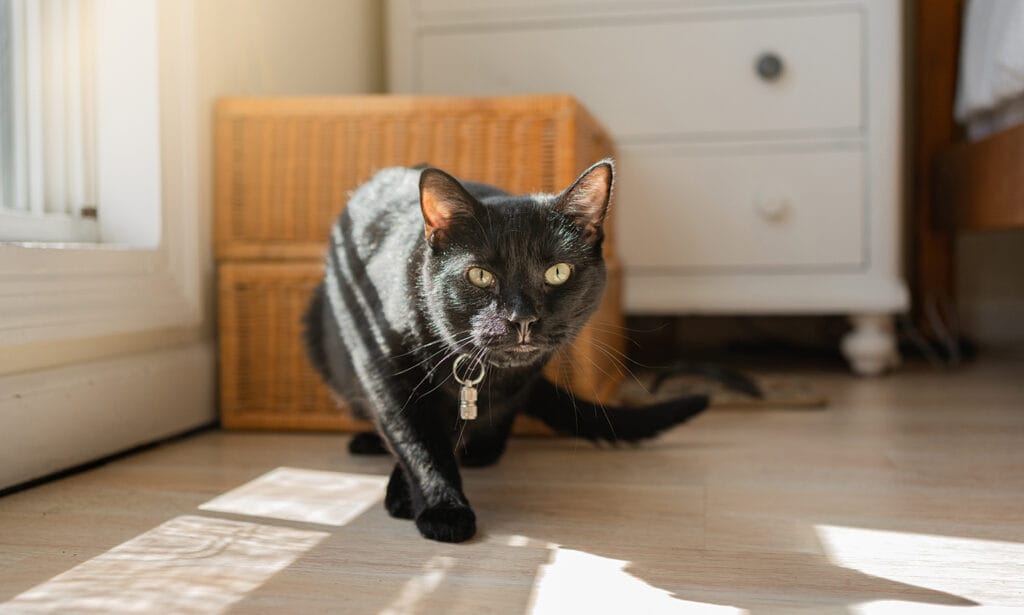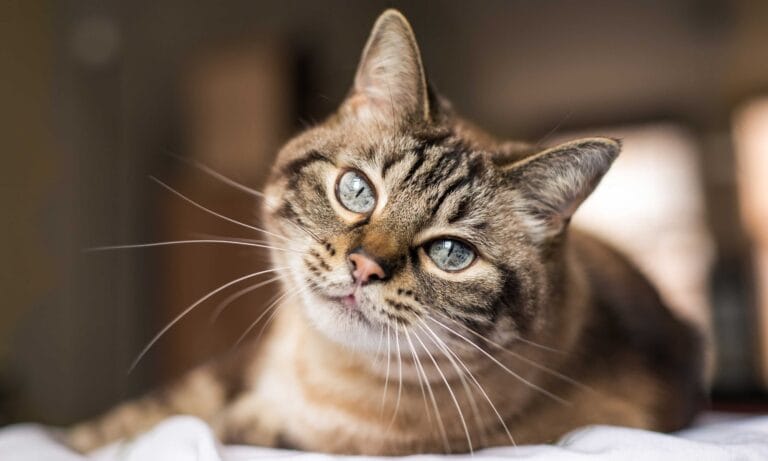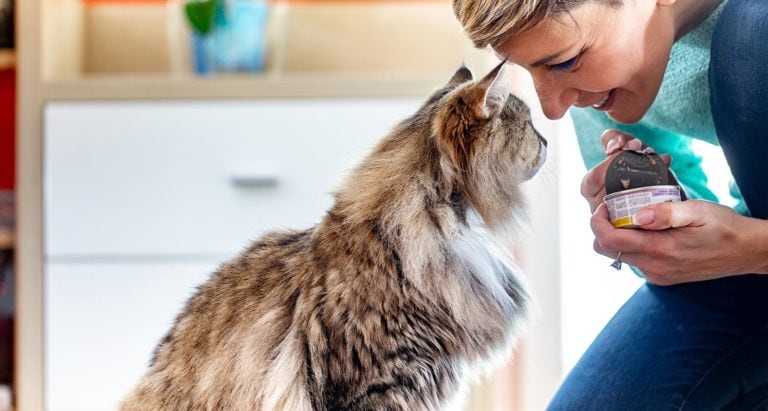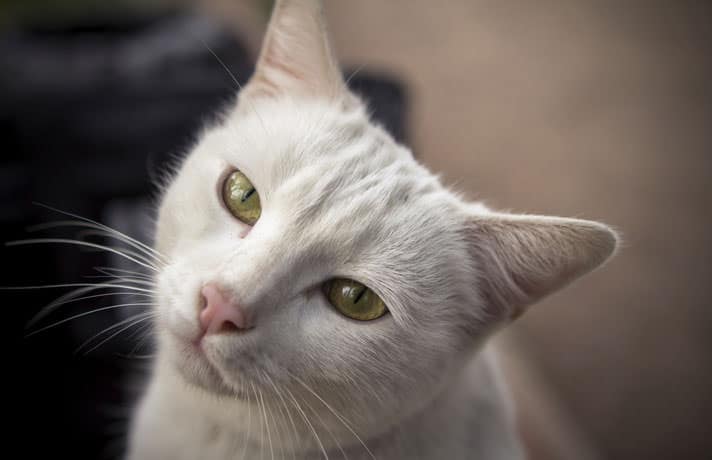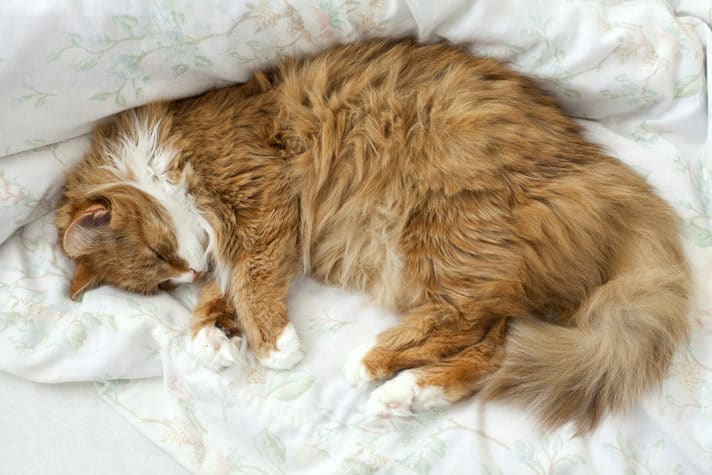For many years now, your beloved cat has used the litter box as expected. But now you’re noticing an off-putting trend: Your senior cat has started peeing and pooping outside the litter box, even using the floor throughout the house (and being sneaky about it).
Yikes! This is not fun for you or your elderly cat. It’s disappointing to find “surprises” around the house, right? Your cat is probably distressed about this as well. And you’re not sure what to do at this point. Take heart. We’re here to answer your questions about this troubling trend and provide tips to help solve the problem.
In This Guide:
What Should I Do If My Senior Cat Stops Using the Litter Box?
As cats age, it’s not uncommon for strange issues to suddenly pop up, such as a senior cat pooping outside the litter box, or an elderly cat peeing over the edge of the litter box–which is why we’re offering our top tips to help.
The first and most important tip we can offer you? Schedule an appointment with your cat’s veterinarian. Any time you’re concerned about your cat’s health and behavior, your vet is the best resource for a proper diagnosis and treatment plan that truly helps. And that includes changes in litter box behavior.
A sudden change in behavior—like an elderly cat pooping on the floor—can be a small hint of a larger issue, says Jackson Galaxy, a cat behavior and wellness expert, host of Animal Planet's “My Cat From Hell,” and a New York Times best-selling author.
“If your cat starts doing things [they] never did before, such as avoiding the litter box, go to the vet. Don’t bother Googling or asking friends—just go to the vet,” Galaxy says. This also applies if you suspect your cat has stopped peeing entirely.
Cats are experts at hiding medical issues. That’s why we strongly recommend seeing your vet for litter box problems. There may be a simple solution, but you’ll only know after a professional exam.
During the appointment, your vet’s team will discuss your cat’s behavior and run different tests based on your cat’s specific condition. This effort may indicate an underlying medical issue in your pet. If so, your vet’s team will work with you on the best course of treatment.
Why Is My Senior Cat No Longer Using the Litter Box?
There are a few reasons why your cat may have stopped using the litter box, including medical issues, aging and environment changes.
Medical Issues
In cases where a senior cat is suddenly not using the litter box, it’s often linked to medical issues that may have gone unnoticed by the cat’s parent, according to Amy Martin, an animal behaviorist as well as owner and chief operator of Conscious Companion in Falls Church, Virginia.
“House soiling behavior is often misattributed to the cat trying to get back at the owner, but this is actually your senior cat’s calling card for help,” Martin says. “Cats may appear well despite underlying disease, compensating for it until they are no longer able to do so.”
If your senior cat is displaying litter box problems, this could be caused by one or more medical issues, such as:
- Degenerative joint disease (various forms of arthritis)
- Cancer
- Diabetes
- Kidney disease
- Muscle atrophy or joint thickening
- Spondylosis deformans, a spinal condition that more commonly occurs in senior pets
- Decreased vision/blindness
- Urinary tract infections
- Lower urinary tract disease
- Thyroid issues
General Aging
When your older cat is peeing outside the litter box, it could mean that using a litter box is no longer an easy task for your cat.
“When a cat reaches his senior years … the litter box can become the Box of Doom to a senior cat with a stiff, achy body. What was once an easy hop in and out to do their business is now a painful and laborious experience for them,” Martin says.
“They think, ‘Every time I go to that place, it hurts me, so I’m going to stop going there,’” Galaxy adds.
Learn more about senior cat age and the signs your cat is becoming a senior.
Galaxy suggests looking for signs that moving about is difficult for your senior cat, like struggling to jump on and off the couch or struggling to use stairs.
Once again, talk with your cat’s vet. Keep detailed notes so you can share your observations with the vet’s team.
Environment Changes
Stress may also be at play here. Reduced tolerance for change is also a common reason for a senior cat not using the litter box, Martin says. “Older cats may be more sensitive to changes in the household, since their ability to adapt to unfamiliar situations begins to diminish with age,” she says.
Even with environmental stress, an elderly cat pooping on the floor—or urinating on the floor—is never done out of revenge or spite, Galaxy says. Rather, he adds, it’s more likely that the environmental stress is being manifested as physical distress.
What kinds of changes cause stress in cats? Some examples are moving to a new home, introducing a new pet to the family, having a baby or even just rearranging the furniture.
Learn more about stress in cats and how you can help.
Your Current Litter Box (and Litter) May Not Serve Its Purpose Anymore
With stiff joints and other common issues in older cats, you may need to change the litter box itself. Try swapping your current litter box for a low-entry litter box for senior cats. In addition, consider changing the litter to a brand that’s especially formulated for older cats.
What’s the Best Litter Box (And Litter) for Senior Cats?
It’s important to visit your vet to determine why your senior cat has stopped using their litter box. But in the meantime, you can also make immediate adjustments around your home to help encourage more consistent litter box use.
- Consider switching to a litter box with low sides. Elderly cats may have difficulty getting in and out of top-entry or high-sided litter boxes. Try the Frisco Senior and Kitten Cat Litter Box. “Easier access to the litter box can be helpful for senior cats who are starting to have trouble getting up and down the couch or stairs,” Galaxy says.
- Consider using less litter. The amount of litter also can cause problems. “Senior cats who are having a hard time pooping in the box could be having trouble because there is too much litter,” he says. “If they don’t have anything to grab onto while they’re squatting, it just makes life a little harder, especially if their arthritis is in their wrists or paws.”
- Try different types of litter. Galaxy’s go-to is unscented, fine litter—“as close to sand as you can get,” he says. Certain brands offer litter that’s especially formulated for senior cats, including Elsey's Senior Crystal Cat Litter. The key is to put the new litter in a new box while keeping your cat’s current litter brand in the usual box. “If you see your cat is gravitating to the new litter box, then you can start changing out the rest of the boxes,” Galaxy says.
- Add more litter boxes to help guide your senior cat. If you switch to a low-sided litter box and new litter, and your old cat is still doing their business elsewhere, try placing more litter boxes around your home. Galaxy suggests putting them in places where your cat has recently peed or pooped. You also can try placing one on each floor of your home. For many senior cats, he says, it’s a matter of convenience, and simply adding more litter boxes can help alleviate the problem.
How Else Can I Help My Elderly Cat Stop Peeing and Pooping Outside the Litter Box?
Pay Attention to Your Cat’s Diet
As your cat ages, your vet may advocate for different food, as senior cats have different dietary needs than their younger selves did. Here are just two examples of senior cat diets your veterinarian may recommend:
Adjusting the diet to fit your old cat’s new needs will help them function as they should, Galaxy says. Of course, you’ll want to ask your vet about the best way to introduce a new diet to your senior cat to avoid stomach problems.
Hydration is important, too. “As cats get older, one of the most important things we can do for them is keep water running through their bodies,” Galaxy says. He suggests adding a few pet fountains, such as the Frisco Whimsical Leaf Round Fountain, around the house to encourage your cat to drink more.
Also, try adding a little warm water to your cat’s food. Especially with dry kibble, soaking your cat’s food not only helps make the food more aromatic and enticing but can also help increase fluid intake.
Learn more about senior cat food and how to feed your older cat.
Keep a Pleasant Environment
“Because senior cats are easily stressed, changes in their environment should be kept to a minimum and incorporated gradually,” Martin says. “Managing your senior cat’s environment effectively will help you maintain your lifelong bond with him.”
Giving your cat a quiet, darker place to retreat to—a “base camp”—is important, Galaxy says. He also suggests considering soothing supplements. A probiotic like Purina Pro Plan Veterinary Diets Calming Care Cat Supplement contains a probiotic strain known to lower the stress hormone cortisol and promote relaxation, while an herbal solution like Zesty Paws Calming Bites can have a calming effect on your cat.
Consult your vet before giving your cat supplements.
Keep Calm and Love Your Fur Baby
Ultimately, you know your senior cat better than anyone, so the best thing to do is listen to your gut and seek professional advice. “Any time you feel that gnawing sensation in you that all is not right, you should be validating or striking down your theory by going to the vet,” Galaxy says.
Your vet’s team will offer the best solutions and bring cat-litter harmony back to your home.
Caring for your senior cat:
Share:
